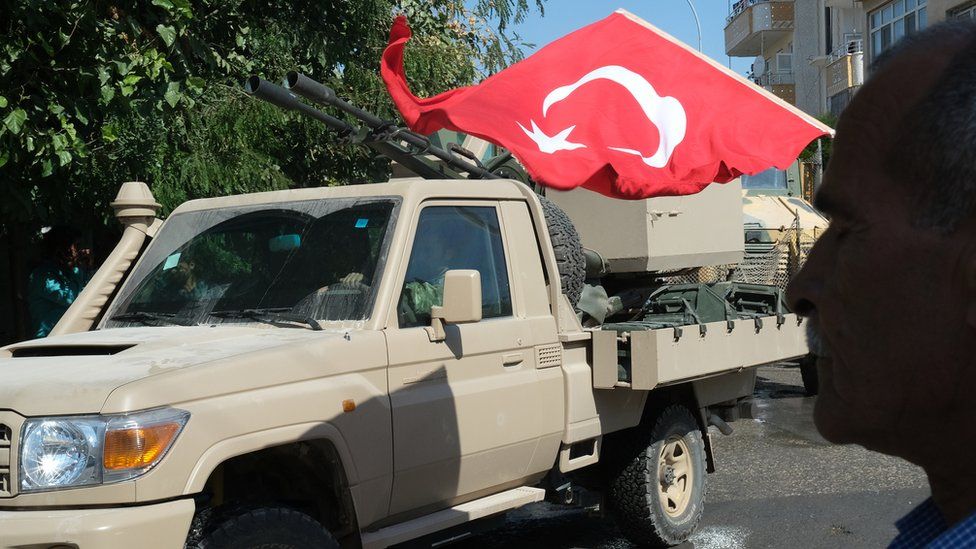Islamic State: What happens to those expelled by Turkey?
- Published

Turkey has begun deporting foreign nationals alleged to be linked to the Islamic State group, even though some European countries are reluctant to take back their citizens.
Germany, Denmark and the UK have stripped people of citizenship for allegedly joining jihadist groups abroad so as to prevent their return.
But Turkey says it's in the process of sending back more than 20 Europeans, including Germans, Danes, French and Irish nationals.
So what happens to these people once they are expelled from Turkey?
What is Turkey's position?
Turkish President Recep Tayyip Erdogan says many hundreds of foreign fighters are currently being held in prisons in Turkey.
Earlier this month, the government in Ankara indicated that it would send back these militants even if their citizenship had been revoked in their countries of origin.
We will send Islamic State members back to their own countries whether or not their citizenship is revoked.
"The world has come up with a new method now: revoking their citizenships," Turkey's Interior Minister Suleyman Soylu said.
"They are saying they should be tried where they have been caught. This is a new form of international law, I guess. It is not possible to accept this."
What's the process for dealing with foreign nationals?
Foreign nationals abroad are entitled to consular assistance and this would normally require direct contact between diplomats from their country and the individuals involved.
This can be facilitated by international agencies such as the International Committee of the Red Cross (ICRC), which tries to help by identifying those held in detention.
In the case of camps in Syria holding suspected IS members and their families, some governments have argued it's simply too dangerous for their officials to make contact because of the security situation.
It's not clear if those being sent back by Ankara were detained inside Turkey or were seized in Syrian territory.
Some European countries have been reluctant to take back citizens who joined IS, worried about public opinion and the legal challenges of dealing with these citizens.
But the UN has been very clear that countries should take responsibility for their citizens.
"Foreign family members should be repatriated, unless they are to be prosecuted for crimes in accordance with international standards," the UN High Commissioner for Human Rights, Michelle Bachelet, has said.
She added it was up to the countries themselves to take responsibility if their citizens "are suspected of committing serious crimes in another country, or detained on any grounds".
Under international law, it is illegal to deprive nationals of citizenship if to do so would leave them stateless.
What's happening to those expelled from Turkey?
Three IS jihadist fighters, citizens of Germany, Denmark and the US, were deported from Turkey on 12 November with many more soon to be repatriated, Turkish authorities have said.
The US citizen was stranded on the land border with Greece, as he wanted to go there rather than return to the US. Greece refused him entry and Turkey has said it's begun moves to send him to the US.
The Danish national is now reported to be in custody after being arrested on his arrival in Copenhagen.
Germany says Turkey has informed it about its plan to deport more German nationals.
In the past, Germany has taken back IS members and either prosecuted them or placed them in rehabilitation programmes.
France has insisted that citizens captured inside Syria or Iraq should face trial locally. Earlier this year, four Frenchmen were sentenced to death in Iraq in a judicial process that was heavily criticised.
However, it's also reported under an arrangement with Turkey dating back to 2014, France has quietly taken back a number of jihadists, who were arrested once they arrived on French soil.
Some foreign governments have revoked citizenship to prevent the return of suspected IS members - for example in the case of Shamima Begum from the UK, who has been held at a camp in Syria.
The UK decision was based on the belief that she could claim Bangladeshi citizenship through her mother, although Bangladesh has denied this is the case and insists she is the responsibility of the UK government.
Legal and official limbo
It's clear that in some cases there may have to be an arrangement involving third parties, if Turkey expels foreigners whose home countries will not take them back or if the individuals do not want to return to those countries.
The US, which has criticised European countries for not taking back jihadist fighters, has had its own difficulties with suspected IS members who are US citizens.
A man captured in Syria and then held at a US military facility in Iraq for over a year was eventually freed in Bahrain, where his family lives, after the US authorities cancelled his passport to prevent him returning to the US.
And it's possible there could be other cases where such arrangements have been made but not publicised.